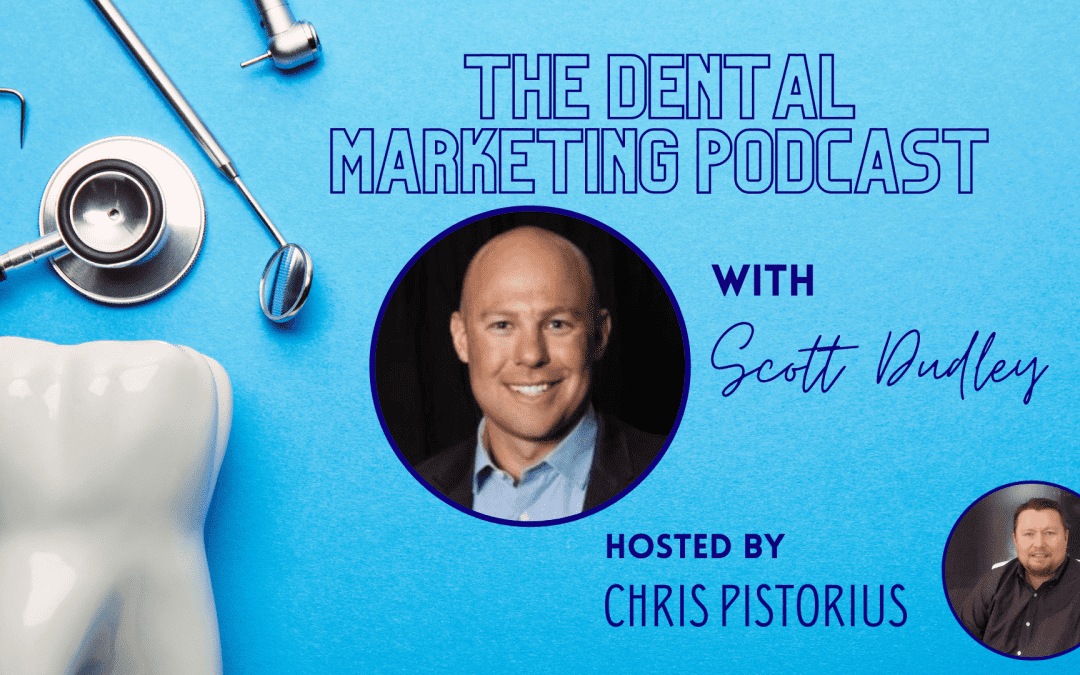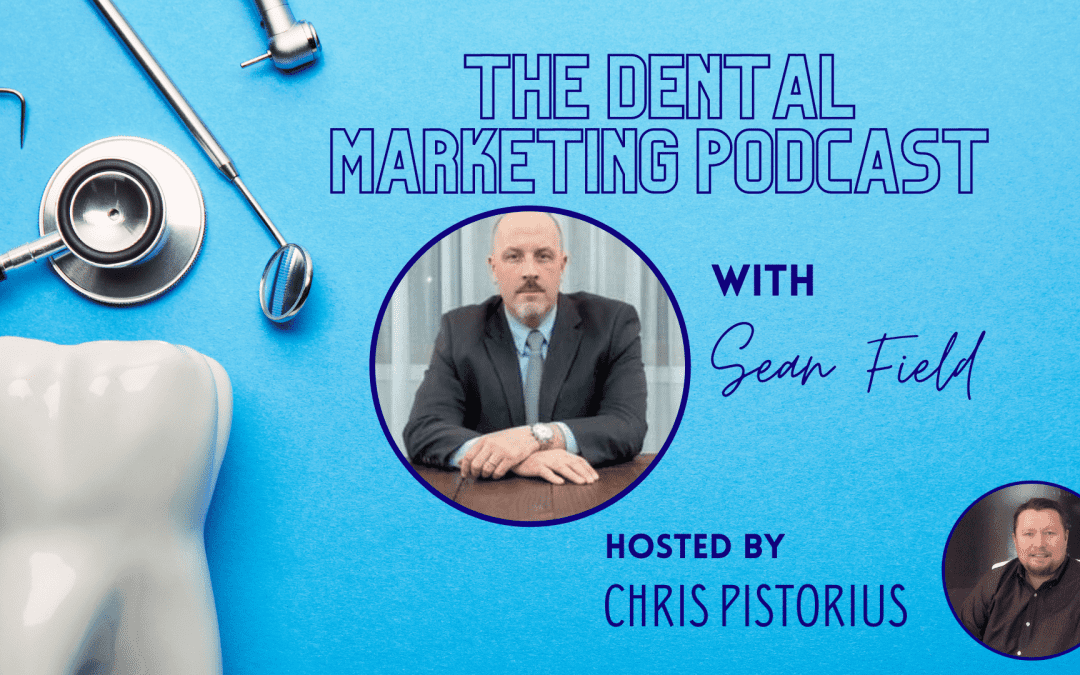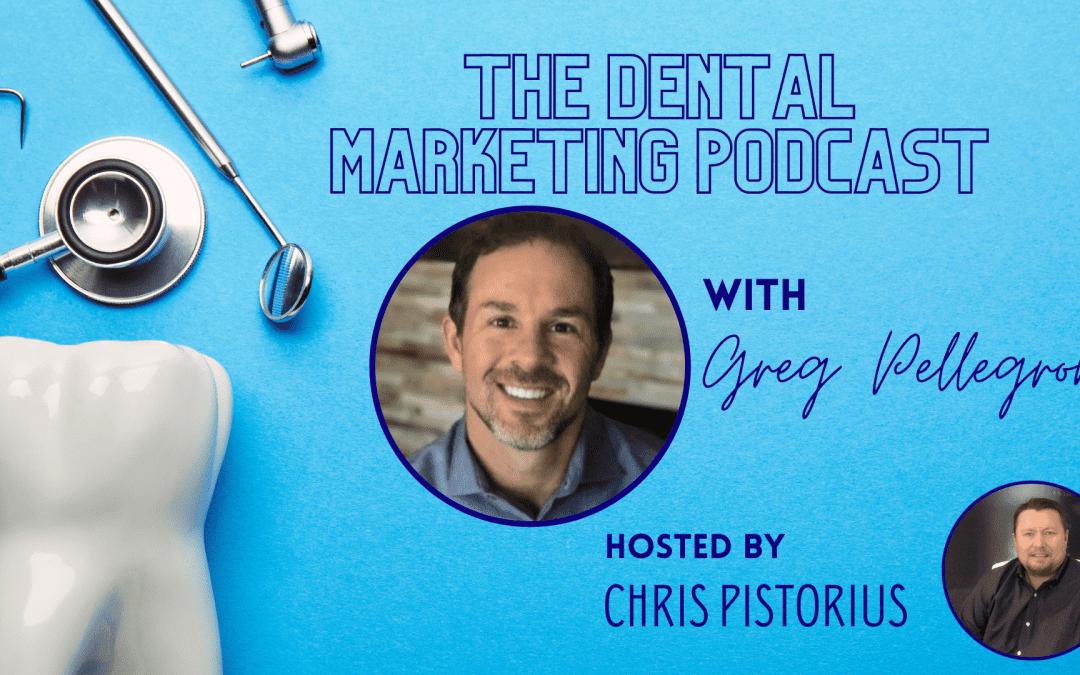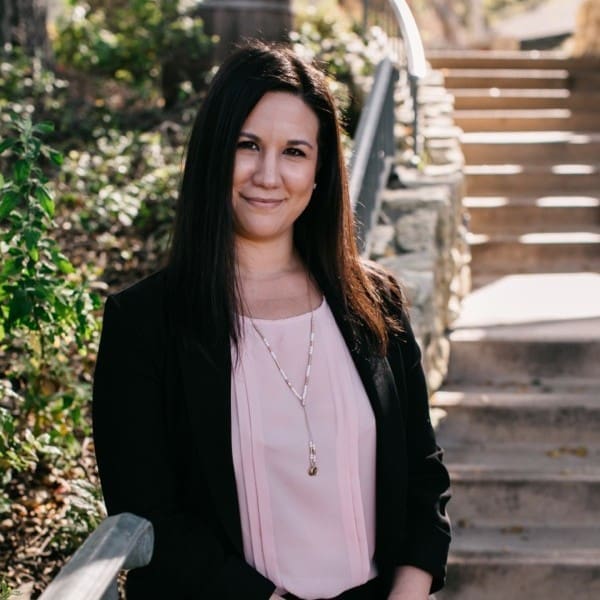
The Business Side Of Dentistry. The Good, The Bad, And The Ugly
Listen to the audio-only version:
Watch the episode:
Chris Pistorius talks with Scott Dudley, the founder and CEO of Branin, about the importance of focusing on the business side of owning a dental practice.
View Full Transcript
Chris Pistorius (00:04):
Hey, everybody. It’s Chris Pistorius here again with another episode of the Dental and Orthodontic Marketing Podcast. Thanks for joining us. I am here with Dr. Scott Dudley. Dr. Dudley is the CEO of Branin, which is an organization, has a few different locations, dental practices here in the Colorado area. Dr. Dudley is also a practicing dentist, and he’s got an awesome story that I can’t wait to share with you guys. So, Dr. Dudley, thanks so much for being on the show today.
Scott Dudley (00:39):
Yeah. Thanks so much for having me.
Chris Pistorius (00:41):
Of course. So, let’s just start off. Off air, we talked about how you got your start, and it’s pretty compelling. Why don’t you talk to me, first of all, about your personal history in dentistry and how you got going?
Scott Dudley (00:56):
Yeah. I think I have, well, I don’t know if it’s very unique, but I went to dental school.
Chris Pistorius (01:05): That’s good.
Scott Dudley (01:10):
And somehow made it through there. But got through dental school. I did the Air Force AEGD program at Andrews Air Force Base, and spent a few years at Fort Bragg, what was then Pope Air Force Base, and came out of there and tried to find an associateship, and did in downtown Washington, DC. And I guess like the trajectory of a lot of dentists, ended up deciding to go out on my own about 18, 24 months after that, and built a practice from scratch in 2008, the last crisis. And spent a few years on that practice, and ultimately built a second practice. And then in 2016, was getting tired and a little burned out. And I wanted to get married, and I’d spent a lot of time on the business, and on the practices, and growing and developing them. We ended up with seven doctors between the two locations.
Scott Dudley (02:13):
So, I thought there might be a better way, and I was trying to figure out how to make that happen. So, I ended up selling to a Dental Care Alliance, which is one of the larger DSOs in the country. And that experience taught me a lot of things, and I’m very appreciative of that experience. Ultimately, went back to business school to University of Virginia at Darden. And then in 2019, my family and I decided to move to Colorado, and that was largely for personal reasons, but I knew I was about to restart my career. And I thought, “What better place than in Boulder, Colorado?” So, here I am.
Chris Pistorius (02:56):
Awesome. So, I mean, that’s pretty unique. I mean, you said, how old were you, 39 years old when you
sold your first practices? Scott Dudley (03:02):
ScottDudley (Completed 08/03/21) Page 1 of 7 Transcript by Rev.com
This transcript was exported on Aug 04, 2021 – view latest version here.
Yeah. I was 39 when I sold. I had started when I was, I had built that first practice. I think I was 31 when
the doors opened. So, I lived the life cycle of a dentist in a relatively short period of time.
Chris Pistorius (03:16):
Yeah. So, and that’s what I want to leverage here a little bit is we have a lot of people that are coming out of school, or getting ready to, maybe they’ve been an associate for a while, and they’re getting ready to take the plunge into starting their own practice, but we’ve got even more people there at the end of their careers. And it’s time, they want to sell, or maybe they’re going to, not at the end of their career and they just don’t want to have to run a business anymore.
Scott Dudley (03:40): Yeah.
Chris Pistorius (03:40):
Maybe you could tell us, what are a couple of things that you might’ve made mistakes on, or you would
do differently, first of all, about selling a dental practice?
Scott Dudley (03:52):
The market has changed and continues to change. And I think at the end of the day, ultimately, a dentist has to decide, do they want to be part of a DSO, and why, or do they ultimately want to sell to another dentist or a group of dentists? And I think that’s the first box that really needs to be checked, because it’s emotional, it’s legacy, but it’s, what does this picture look like after the transaction happens? Are you involved? Are you not involved? The financials are not, I know there’s a lot of, it seems like there’s a lot of ambiguity or vagueness around the financials, but it’s really not rocket science. Because if you’re selling to a dentist, a single dentist, the banks are going to loan 80%, 85% of collections, more, that’s about what your practice is going to be worth.
Scott Dudley (04:51):
If you’re selling to a DSO, they’re going to use multiples, and it’s going to scale with the size of your EBIT or your free cashflow. So, the numbers are really not, they’re the easiest part. I think the harder part is deciding, what do you want your legacy to be? Who do you want to take control of your staff and your patients? And I think for us as dentists, that should be first and foremost in the decision making process.
Chris Pistorius (05:20):
Yeah. No, I think that’s, everybody thinks about the money part of it. And very infrequently have I heard on this show specifically, when I talked to people about buying, selling dental practices, do I hear the word legacy. And how do you want to be remembered, and what do you really want to accomplish when you sell a practice? So, I mean, I think that’s pretty key. So, on the other end of this, man, let’s say that it’s time for you to buy a practice. Two biggest options I see is, do you just take a bunch of debt and start up from scratch, or do you go and try to find a good fit that’s an existing practice? What’s your recommendation for that?
Scott Dudley (06:00):
Yeah. That’s the million dollar question, no pun.
ScottDudley (Completed 08/03/21) Page 2 of 7 Transcript by Rev.com
This transcript was exported on Aug 04, 2021 – view latest version here. Chris Pistorius (06:04):
[crosstalk 00:06:04] million dollar question.
Scott Dudley (06:05):
Yeah. And our group, specifically Branin, we’re wrestling with that. Because of the DSOs and private equity, prices have been pushed up. They’ve been pushed up. And so, the cost to buy a practice now, that’s in good working order, that’s ready to go, turnkey, if you will, without needing to put a bunch of equipment or technology into it, is pretty expensive. But you really shouldn’t probably be thinking about, what I talk to folks about, is you probably shouldn’t be thinking about ownership, unless you have the confidence in yourself that people want to see you as a dentist. And so, with that confidence, you should be able to leverage that confidence and to make a decision, if a build-out is going to cost you $600,000, well, and you can attract patients, then if you’re paying more than $600,00 or $700,000 for a business, A), do you know how to run it? B), are the people of that business going to stay there?
Scott Dudley (07:17):
C), do you have an appreciation for the value of that business? Meaning, are you overpaying for something that you could have the same cash flow if you just built it from scratch? I think those are difficult questions if you don’t have a background in finance or business to understand when you’re putting together the spreadsheets to figure it out. But at the end of the day, it really comes down to your confidence of building a team and building a patient base. You probably shouldn’t be entertaining ownership if you don’t have confidence in one or both of those.
Chris Pistorius (07:52):
Yeah. I’ve also seen, there’s this book out there, I can’t remember what it’s, E-Myth Revisited is the name of it. And they talk about one of the top reasons why, not just dental practices, but small businesses in general fail, and it’s because typically the person opening the business is really good at the technical work of the business, but they don’t really know how to run a business. So, they don’t know about accounting, and bookkeeping, and marketing, and how to just run the business. And I’ve talked to some people from dental schools, and they talk a lot about how good they are in teaching dentistry, but what’s interesting about you is you went back and went to business school. Did you find that coming out of dental school, that maybe there isn’t a lot of time spent on how to run a dental practice? Is it really just about dentistry, and that’s why you had to get back into the business side of it?
Scott Dudley (08:45):
Yeah. I think for me, personally, I mean, I wanted to understand how to scale private practice. I knew that DSOs are out there, and there’s certainly a place for them. It’s not coincidence that they’re doing very well, and M&A activity is on the rise, and consolidation is accelerating. But I also thought that there deserved to be a dentist-owned economy of scale option, where just a group of dentists got together and manage themselves, and led themselves, and made decisions for themselves. And so, our organization at Branin is designed to have the dentists front and center in the circle, and the way that we think of our organization. And everything stems from the leadership that that dentist provides, what we call our partners at each office location. But we get the same economies of scale that DSOs get. We have all the advantages that DSOs get.
Scott Dudley (09:52):
ScottDudley (Completed 08/03/21) Page 3 of 7 Transcript by Rev.com
This transcript was exported on Aug 04, 2021 – view latest version here.
We’re just not taking investor money. We’re not, our budgets are not being set by somebody other than ourselves. We make our own hiring decisions. And I think at the end of the day, most DSOs operate with a lot of associate dentists in the DSO. They’re on year contracts.
Chris Pistorius (10:13): Right.
Scott Dudley (10:13):
And if you think about, if you wanted to go to a doctor and you knew that they were on just a year contract, and they may or may not be there next year, our argument, our philosophy is, well, we think that that’s inferior to a doctor who’s committed to a location for multiple years because they’re an owner there. So, the fact that that ownership, yes, there’s equity there, and yes, there’s financial reasons, but ultimately, we think that we will have higher demands for our practices because our doctors aren’t changing over.
Scott Dudley (10:46):
They’re not changing over because they’re not on year contracts, because they’re owners. And so, to answer your question, I did, it was very valuable for me to go back to business school to understand how all of these things played in, and so that we weren’t an organization that just had year in, year out contracted dentists, that we were constantly recycling, and that our patients were constantly going through different providers constantly. So, business school was very helpful. Obviously, they joke that in dental school you don’t get any of that. And I think it’s only because of my experience that I realized there was a lot I didn’t know, even though I had done quite a bit. And so, I really appreciated borrowing from other industries in business school.
Chris Pistorius (11:34):
Yeah. Well, you’re one of the few, maybe the only I’ve interviewed that has gone the business route option too, and it looks like it’s certainly paying off for you. So, that’s really good. So, I want to talk a little bit more about your organization, Branin, and you hit some great key points on why you’re, it’s a DSO model, I guess, but it’s the not DSO model. And it’s got a unique perspective where you’re not taking private money, and you’ve got equity from the [inaudible 00:12:04] ownership partner, in terms of each location that you have. You currently have, you’re building out your third location now, is that right?
Scott Dudley (12:12):
We’re building out our third location. All in the Northern half of the front range here in Colorado. Yeah.
Chris Pistorius (12:18):
Okay. Gotcha. And so, really, you’re looking for partners that, you’re not just looking for anybody to partner up with. You have a specific goal in mind in terms of partners. Could you tell us a little bit about who that would be?
Scott Dudley (12:31):
Yeah. I like to think of it, I mean, I was an athlete my whole life and it’s like trying to build an all-star
team. And we’re looking for all-stars, not in the sense that they’re the greatest dentist on the planet.
ScottDudley (Completed 08/03/21) Page 4 of 7 Transcript by Rev.com
This transcript was exported on Aug 04, 2021 – view latest version here.
And to your earlier point, I’ve interviewed a lot of dentists for associate and other positions, and anybody can do dentistry. That’s what you’re taught to do. The hard part is getting the dentistry to come in the door.
Chris Pistorius (13:02): Right.
Scott Dudley (13:03):
And I think that’s what separates the mentality from a doctor who’s just, look, they just need bodies in the chair, so they can do dentistry, to the people who are really invested in people and really feel passionate about building relationships with their patients long-term, and creating a business, which ultimately means that you want people to advocate for you. Not just write a review, but actually say, “You’ve got to go to this dentist.” “Why?” “Well, they’re a good dentist, but they really care about me. They really went above and beyond. It was a completely different dental experience.”
Scott Dudley (13:40):
We like to think in our organization that it’s because of the ownership piece. You think about a mom and pop bakery. Think about that experience compared to you go to a big commercial bakery. How does it feel? It feels totally different. Or a coffee shop, that’s that person’s life, and you feel that when you walk in those small businesses. And we’re trying to recreate that on the dental side.
Chris Pistorius (14:06): Right.
Scott Dudley (14:07):
And a bunch of that is, how do we find great dentists, who are great people, and want to be partners of
something bigger than themselves?
Chris Pistorius (14:16): Right.
Scott Dudley (14:18):
Ultimately, our dental group, owned, led, operated by all the dentists in the group, is really looking for those all-stars that have that philosophy, that don’t want to ride the coattails of a corporation, a PE firm, somebody else marketing them for the lowest, cheapest Invisalign product out there. We want people that can build value for themselves, and are passionate about that. And that’s why we value the partnership model. Our partners are 50-50 owners with myself, and our group in general. And we’re trying to get more partners in, and so we’re offering what we’re calling a pathway to partnership, where we’re literally giving people equity up to 50% in the practices, if they will be basically an operator, and they’ll live by those principles and high standards that we collectively as dentists know are so important to our patients.
Chris Pistorius (15:19):
Wow. That’s cool. I haven’t heard that before. So, somebody could come in, if you find the right
personality and type of person you’re looking to work with-
ScottDudley (Completed 08/03/21) Page 5 of 7 Transcript by Rev.com
This transcript was exported on Aug 04, 2021 – view latest version here. Scott Dudley (15:26):
Absolutely.
Chris Pistorius (15:27):
Instead of going and getting a loan, and for ever how much money, they can, up to 50% of that, they can
own by just working.
Scott Dudley (15:35):
Yep. Yeah. I mean, they’re going to be, most people, I say this. You’re going to be probably an associate somewhere, if you’re a dentist. Well, if you want to be an owner, and you want to put in what I call the intangible work ethic that it requires, to not do the dentistry, but get the patients in to do the dentistry, which is really what businesses and ownership to me means, is the difference. And you’re willing to put that work in to grow a business, we’re excited to give people, and offer them up to 50% ownership in that practice. They don’t have to take a loan. They don’t have to do anything. They just have to do what they would normally do, and put the intangible work in.
Scott Dudley (16:14):
And it all stems back to our belief that partner dentists, and people who have ownership, or have equity ownership, are going to treat, look, the staff can feel comfortable that the doctors aren’t changing out. The patients can feel comfortable that doctors aren’t going to be changing out. The doctor’s the rock in our organization, and everything surrounds that. And to the extent that you have people constantly changing in and out, I think so goes your organization, your culture, and everything else.
Chris Pistorius (16:40):
Yeah. It’s hard to build that local-feel dental practice when you’ve got a new dentist in there every year.
Scott Dudley (16:46):
Yeah. And that’s how we’re trying to be trying to be different. And for people who have their own businesses, who may be thinking, “Well, geez, I’d like to be part of a dentist-owned, dentist-led organization,” we have a solution there too. Because what we’ll do is, generally we’ll come in and buy, effectively, 50% of the practice, and that dentist can stay on and be part of our group, and they get some liquidity out of it, but they also get now instead of their being by themselves on an island, they’ve got a whole group of dentists, of like-minded dentists, who are very passionate about great dentistry, and all of a sudden they become part of a fraternity, a sorority, if you will. And that’s really cool, in addition to the savings that you get from the same economies of scales that the DSOs are leveraging.
Chris Pistorius (17:37):
Yeah. In a situation like that, where you might take 50% of a practice, do you take over operations of the
practice, or is that still on the dentist, or is that all negotiable based on the deal?
Scott Dudley (17:48):
There’s just a few things that we try and streamline. And the reason we try and streamline it is to get the economies of scale that our partners want. So, some of it’s software, so we have them use Open Dental. Some of it’s primarily our vendors and who we’re using, so that we can get cost savings. But outside of that, the owner, the partner doctors can choose a la carte, all of the tips and tricks and best practices
ScottDudley (Completed 08/03/21) Page 6 of 7 Transcript by Rev.com
This transcript was exported on Aug 04, 2021 – view latest version here.
that we have. So, whether it’s how we advertise, or the medium that we have, or the revenue cycle management. Whatever it is that they need help with, that’s what we’re there to help for. And I personally do, we do a lot of shadowing. We do a lot of feedback. We have our own study club.
Scott Dudley (18:40):
We do a lot of mentorship. Quite frankly, we do a lot of leadership training, because we know that the growth of a practice is largely dependent on the quality and caliber of the leader, which if it’s the dentist, we need to spend a considerable amount of resources developing that person’s skills. And they may have ceilinged or gotten stressed out, because those skills weren’t as developed as they could be. And I say, what works for a dentist at a half million or a million dollar practice, completely different skill set at $2 million, $3 million, $5 million practices, multiple locations. And if you’re not keeping up with the leadership and the business acumen needed to scale the business part of it, you’re going to probably find yourself pretty stressed out. And so, those are all things that I personally enjoy becoming involved with and helping the partners out with.
Chris Pistorius (19:33):
Yeah. That’s awesome. Well, hey, Scott, thanks so much for taking the time today. Let me ask you this. If somebody is watching this and they think that maybe they might, could be a good fit for your organization, what’s the best way to reach out to you guys and start that process?
Scott Dudley (19:49):
Yeah. So, Branin Partners, B-R-A-N-I-N, partners.com is our website. My personal email is Dudley, D-U-D- L-E-Y-S, as in Sierra, B as in bravo, at gmail.com. And people can certainly reach out. Like I said, we’re not looking for just anybody. We’re looking for folks who want to be part of an all-star team, but specifically an all-star team that is dentist-centric and focused, and is the anti-DSO.
Chris Pistorius (20:21):
Right. Gotcha. It makes sense. Okay. All right. Well, Scott, thanks again for the time.





